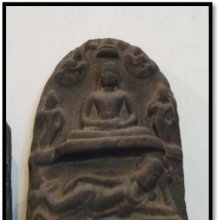Suvrata, Suvratā, Su-vrata: 24 definitions
Introduction:
Suvrata means something in Buddhism, Pali, Hinduism, Sanskrit, Jainism, Prakrit. If you want to know the exact meaning, history, etymology or English translation of this term then check out the descriptions on this page. Add your comment or reference to a book if you want to contribute to this summary article.
Suvrata has 23 English definitions available.
Images (photo gallery)
Languages of India and abroad
Sanskrit dictionary
[Deutsch Wörterbuch]
Source: Cologne Digital Sanskrit Dictionaries: Böhtlingk and Roth Grosses Petersburger WörterbuchSuvrata (सुव्रत):—
1) adj. (f. ā) a) recht gebietend, herrschend: sū.ayaḥ [Ṛgveda 1, 125, 7. 190, 6.] Āditya [6, 49, 1.] [Vājasaneyisaṃhitā 21, 5.] König [Ṛgveda 9, 20, 5. 57, 3.] — b) gute Gewohnheiten habend, seine Pflichten gewissenhaft erfüllend (von Männern und Frauen); = sadvrata [Hemacandra’s Anekārthasaṃgraha 3, 313. fg.] = śobhanavrata [Medinīkoṣa t. 172. -] [Mahābhārata 1, 8455. 4, 1228. 8, 1486. 14, 2714.] [Rāmāyaṇa 1, 6, 12 (10 Gorresio). 35, 7. 2, 24, 26. 91, 22.] [Rāmāyaṇa Gorresio 1, 4, 3.] [Varāhamihira’s Bṛhajjātaka S. 15, 2.] [Mārkāṇḍeyapurāṇa 75, 14. 106, 35.] [Spr. (II) 1943, v. l.] [Bhāgavatapurāṇa 6, 18, 2. 8, 22, 30. 9, 1, 29. 10, 71, 15.] [PAÑCAR. 1, 8, 33.] so v. a. brahmacārin [Yājñavalkya’s Gesetzbuch 1, 108.] Häufig als Anrede [Mahābhārata 3, 12752. 5, 7492.] [Rāmāyaṇa 1, 9, 34 (35 Gorresio). 13, 55. 53, 19. 2, 52, 8. 7, 26, 50.] [Spr. (II) 4605.] [WEBER, KṚṢṆAJ. 290.] [Bhāgavatapurāṇa 4, 9, 19. 13, 2. 7, 4, 44. 8, 16, 15.] [PAÑCAR. 1, 13, 18. 4, 2, 11.] [Rgva tch’er rol pa ed. Calc. 209, 1.] — c) gutmüthig, fromm: Ross [Mahābhārata 4, 1276.] Stier [3, 12724.] Kuh [Amarakoṣa 2, 9, 72.] [Trikāṇḍaśeṣa 3, 3, 192.] [Hemacandra’s Abhidhānacintāmaṇi 1268.] [Hemacandra’s Anekārthasaṃgraha] [Medinīkoṣa] [Mahābhārata 13, 3517. 3598. 4427.] —
2) m. Nomen proprium eines Wesens im Gefolge Skanda's [Mahābhārata 9, 2544.] verschiedener Männer [Mārkāṇḍeyapurāṇa 116,13.] [Oxforder Handschriften.5,b,34. 12,b,46.] ein Prajāpati [Rāmāyaṇa 3, 20, 7.] ein Sohn des Manu Raucya [Mārkāṇḍeyapurāṇa 94, 31.] des Nābhāga [Rāmāyaṇa 2, 110, 34.] des Uśīnara [Harivaṃśa 1677.] des Kṣemya (Kṣema) [Viṣṇupurāṇa 465.] [Bhāgavatapurāṇa 9, 22, 46.] des Priyavrata [WILSON], Sel. Works [2, 193.] ein Gelehrter [Colebrooke 1, 108.] ein Historiker [Rājataraṅgiṇī 1, 11. fg.] ein Arhant bei den Jaina [Hemacandra’s Anekārthasaṃgraha] der 20te der gegenwärtigen Avasarpiṇī [Hemacandra’s Abhidhānacintāmaṇi 29.] [Oxforder Handschriften 186,b,16.] [Śatruṃjayamāhātmya.9,3.] der 11te der zukünftigen Utsarpiṇī [Hemacandra’s Abhidhānacintāmaṇi 54.] —
3) f. ā Nomen proprium einer Apsaras [VYĀḌI]beim Schol. zu [Hemacandra’s Abhidhānacintāmaṇi 183.] der Mutter des 15ten Arhant's der gegenwärtigen Avasarpiṇī [Hemacandra’s Abhidhānacintāmaṇi 40.] — Vgl. muni und sauvratya .
Sanskrit, also spelled संस्कृतम् (saṃskṛtam), is an ancient language of India commonly seen as the grandmother of the Indo-European language family (even English!). Closely allied with Prakrit and Pali, Sanskrit is more exhaustive in both grammar and terms and has the most extensive collection of literature in the world, greatly surpassing its sister-languages Greek and Latin.
See also (Relevant definitions)
Partial matches: Vrata, Cu, Shu.
Starts with: Suvratadatta, Suvratasvara.
Ends with: Devasuvrata, Munisuvrata, Pashuvrata, Upamshuvrata, Vasuvrata.
Full-text (+52): Suvvaya, Sauvratya, Munisuvrata, Dharmasutra, Suvratadatta, Suvratasvara, Bhanu, Dharmanetra, Kshemya, Dharma, Kshulika, Sumitra, Vriddhaparasharisamhita, Baladeva, Sunetra, Dharmanatha, Rajagriha, Nishpurana, Municuvviratar, Ratnapura.
Relevant text
Search found 39 books and stories containing Suvrata, Suvratā, Su-vrata, Su-vratā; (plurals include: Suvratas, Suvratās, vratas, vratās). You can also click to the full overview containing English textual excerpts. Below are direct links for the most relevant articles:
Rig Veda (translation and commentary) (by H. H. Wilson)
Bhagavati-sutra (Viyaha-pannatti) (by K. C. Lalwani)
Part 3 - On patriarchs < [Chapter 5]
Trishashti Shalaka Purusha Caritra (by Helen M. Johnson)
Part 4: Birth of Dharmanātha < [Chapter V - Śrī Dharmanāthacaritra]
Part 7: Future Tīrthaṅkaras < [Chapter VI]
Part 3: Dharmanātha’s parents (king Bhānu and queen Suvratā) < [Chapter V - Śrī Dharmanāthacaritra]
The Padma Purana (by N.A. Deshpande)
Chapter 21 - Suvrata’s Devotion to Viṣṇu < [Section 2 - Bhūmi-khaṇḍa (section on the earth)]
Chapter 31 - The Account of Suvrata < [Section 2 - Bhūmi-khaṇḍa (section on the earth)]
Chapter 22 - Dharmāṅgada Born as Suvrata < [Section 2 - Bhūmi-khaṇḍa (section on the earth)]
Rudra-Shiva concept (Study) (by Maumita Bhattacharjee)
2.3. Rudra as Śarva < [Chapter 6a - The Epithets of Rudra-Śiva]
5. Protective or benevolent activities of Śiva < [Chapter 5 - Rudra-Śiva in the Purāṇic Literature]
Puranic encyclopaedia (by Vettam Mani)
